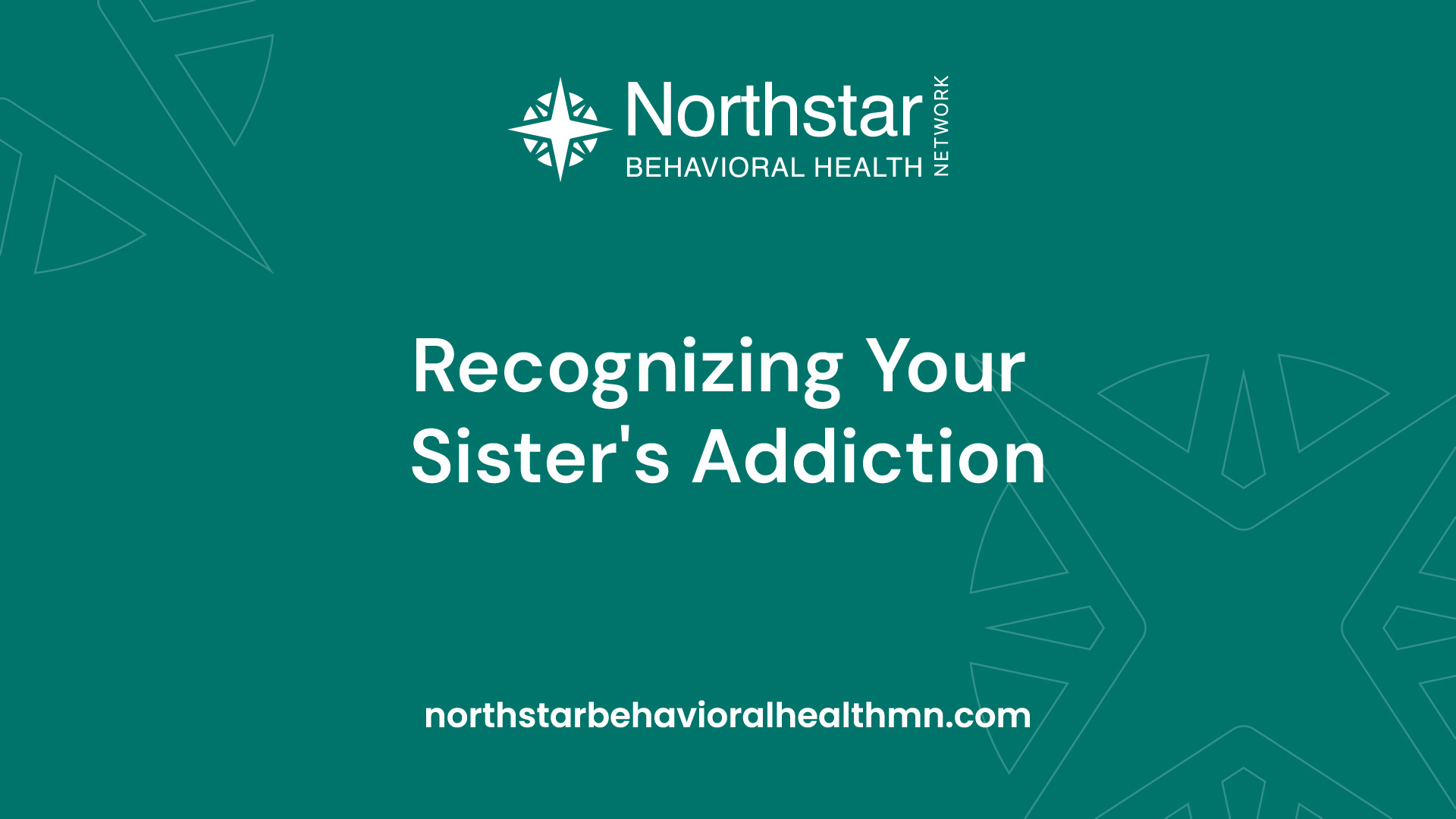August 3, 2024
Helping Your Sister Overcome Addiction
Discover effective ways to support your sister in overcoming addiction.


Understanding Addiction
When you have a sister struggling with addiction, it's important to educate yourself about addiction and its signs. Understanding addiction can help you provide the right support and seek appropriate help.
What Addiction Is
Addiction is a complex condition characterized by the compulsive use of a substance or engagement in a behavior despite negative consequences. It is considered a chronic disease that affects the brain, leading to an intense craving and difficulty controlling the substance use or behavior.
Addiction can involve various substances, such as drugs or alcohol, as well as activities like gambling or gaming. It is important to remember that addiction is not a moral failing or a lack of willpower, but rather a medical condition that requires understanding and support.
Signs of Addiction
Recognizing the signs of addiction can help you identify if your sister is struggling with substance abuse. While the signs may vary depending on the individual and the substance involved, some common signs of addiction include:
- Increased secrecy and withdrawal from family and friends
- Neglecting responsibilities and hobbies
- Changes in appearance or personal hygiene
- Financial difficulties or borrowing money frequently
- Mood swings and irritability
- Physical symptoms like weight loss, changes in appetite, or bloodshot eyes
It's important to approach your sister with empathy and understanding when discussing these signs. Remember that addiction is a sensitive topic, and she may be experiencing shame or denial. Open communication can help create a supportive environment for her to seek help.
To learn more about addiction, its impact, and available treatment options, consider reading our comprehensive article on examining the range of drug abuse addiction and treatment.
Recognizing Your Sister's Addiction

When it comes to helping your sister overcome addiction, the first step is to recognize the signs of her addiction. By observing behavioral changes and having open conversations, you can gain a better understanding of her struggles and provide the support she needs.
Observing Behavioral Changes
One of the key indicators of addiction is noticeable changes in behavior. Keep an eye out for the following signs that may suggest your sister is struggling with addiction:
These behavioral changes may not be exclusive to addiction, but they can serve as red flags that something is amiss. If you notice these signs consistently over time, it's important to address your concerns and offer support.
Having Open Conversations
Initiating open and honest conversations with your sister is crucial in understanding her perspective and encouraging her to seek help. When having these conversations, keep in mind the following tips:
- Choose the right time and place: Find a comfortable and private setting where both of you can talk without distractions or interruptions.
- Approach with empathy and compassion: Express your concern for her well-being and let her know that you are there to support her unconditionally.
- Be prepared for resistance: Understand that she may not be ready to acknowledge her addiction or seek help. Be patient and avoid judgment or criticism.
- Active listening: Give her the space to express her thoughts and feelings without interruption. Show empathy and validate her emotions.
- Offer resources and solutions: Provide information about different treatment options, support groups, or counseling services that she can consider. Consider mentioning our comprehensive article on drug and alcohol dependence leads to addiction for further insight.
Remember, open conversations should be ongoing and supportive. It may take time for your sister to fully accept help, but your willingness to listen and provide assistance can make a significant impact in her journey towards recovery.
Understanding addiction and recognizing the signs is an important step in helping your sister overcome her struggles. By observing behavioral changes and having open conversations, you can offer the support she needs to navigate through this challenging time.
Supporting Your Sister
When your sister is struggling with addiction, providing support can make a significant difference in her journey towards recovery. It's important to approach the situation with empathy, understanding, and a willingness to help. Here are two key ways you can support your sister through her addiction.
Providing Emotional Support
Emotional support plays a crucial role in helping your sister navigate the challenges of addiction. By offering a listening ear and a non-judgmental attitude, you create a safe space where she can openly express her thoughts and feelings. Here are some ways to provide emotional support:
- Be present and attentive: Show genuine interest in her well-being by actively listening to her concerns and experiences. Make time to spend quality moments together, engaging in activities that she enjoys.
- Express empathy: Demonstrate understanding and compassion towards her struggles. Let her know that you recognize addiction as a complex issue and that you are there to support her unconditionally.
- Encourage open communication: Create an environment where she feels comfortable discussing her addiction without fear of judgment or criticism. Validate her feelings and experiences, and avoid placing blame or making her feel guilty.
- Celebrate milestones: Acknowledge her progress and celebrate small victories along the way. This can help boost her confidence and reinforce positive behavior.
Remember, providing emotional support does not mean enabling her addiction. It is essential to strike a balance between being supportive and holding her accountable for her actions. For more information on addiction and treatment options, you can refer to our article on examining the range of drug abuse addiction and treatment.
Encouraging Professional Help
While emotional support is valuable, professional help is often necessary for individuals struggling with addiction. Encourage your sister to seek professional assistance, such as therapy or counseling, to address the underlying causes of her addiction and develop coping mechanisms. Here's how you can support her in this aspect:
- Research treatment options: Familiarize yourself with different treatment approaches and facilities. This will enable you to provide informed guidance and recommendations when discussing treatment options with your sister.
- Offer assistance: Help your sister research and identify suitable treatment centers or professionals. Offer to accompany her to initial appointments or support her in making necessary arrangements.
- Provide encouragement: Reassure your sister that seeking professional help is a courageous step towards recovery. Remind her that she is not alone in this journey and that there are professionals who specialize in addiction treatment and support.
- Highlight the benefits: Emphasize the potential benefits of professional help, such as access to evidence-based therapies, support groups, and resources tailored to her specific needs. Stress the importance of comprehensive treatment to address both the physical and psychological aspects of addiction.
By providing emotional support and encouraging your sister to seek professional help, you can make a positive impact on her recovery journey. Remember to take care of yourself as well by practicing self-care and seeking support when needed. Supporting your sister through her addiction requires patience, understanding, and a commitment to her well-being.
Educating Yourself
When it comes to helping your sister overcome addiction, one of the most important steps you can take is to educate yourself about addiction and its treatment options. By understanding addiction and the available resources, you can offer better support and guidance to your sister.
Learning About Addiction
Learning about addiction is a crucial first step in understanding the challenges your sister is facing. Addiction is a complex disease that affects the brain and behavior, leading to compulsive drug use despite harmful consequences. It is important to recognize that addiction is not a moral failing but a treatable medical condition.
To educate yourself about addiction, consider reading books, articles, and reputable websites that provide reliable information. Look for resources that explain the science behind addiction, its causes, and the impact it has on individuals and their families. Our article on a drug abuse definition might help me decide to get help can provide you with further insight.
Understanding Treatment Options
Understanding the available treatment options is vital for helping your sister find the most appropriate path towards recovery. Treatment for addiction can vary depending on the individual's needs and the specific substance involved. Common treatment options include:
- Detoxification: This initial stage of treatment focuses on safely managing withdrawal symptoms when an individual stops using drugs or alcohol. Detoxification is typically followed by further treatment options to address the underlying addiction.
- Inpatient Rehabilitation: Inpatient rehab programs provide a structured environment where individuals can receive intensive treatment and support. These programs often include individual counseling, group therapy, educational sessions, and aftercare planning.
- Outpatient Rehabilitation: Outpatient programs offer flexibility for individuals who may not require 24/7 supervision. These programs allow individuals to attend therapy sessions while continuing with their daily responsibilities.
- Medication-Assisted Treatment: In some cases, medication may be prescribed to help manage cravings and withdrawal symptoms. Medication-assisted treatment is often combined with counseling and behavioral therapies.
- Support Groups: Support groups, such as Alcoholics Anonymous (AA) or Narcotics Anonymous (NA), can provide valuable peer support and ongoing encouragement during the recovery process.
By understanding these treatment options, you can have informed discussions with your sister about what might work best for her. It's important to remember that every individual's journey to recovery is unique, and what works for one person may not work for another. Encourage your sister to consider seeking professional help from addiction specialists and treatment centers.
For more information on addiction treatment, our article on examining the range of drug abuse addiction and treatment can provide additional insights.
By educating yourself about addiction and its treatment options, you can become a valuable source of support for your sister. Remember to approach conversations with empathy, understanding, and a willingness to listen. Encourage her to seek professional help and be there to offer guidance throughout her recovery journey.
Setting Boundaries
When it comes to helping your sister overcome addiction, setting boundaries is an essential part of the process. Boundaries provide structure and establish guidelines that promote healthy relationships and recovery. In this section, we will explore the importance of boundaries and discuss healthy ways to set them.
Importance of Boundaries
Setting boundaries is crucial for both you and your sister during the recovery process. Boundaries help protect your own well-being and prevent enabling behaviors that can hinder her progress. By establishing clear boundaries, you can create a supportive environment that encourages accountability and self-responsibility.
Boundaries also help your sister understand the consequences of her actions and the impact they have on herself and others. They provide a framework for her to develop self-discipline and make healthier choices. It's important to communicate your boundaries with empathy and compassion, emphasizing that they are in place to support her recovery journey.
Healthy Ways to Set Boundaries
When setting boundaries with your sister, it's important to be clear, consistent, and respectful. Here are some healthy ways to set boundaries:
- Establish clear expectations: Clearly communicate your expectations regarding her behavior and the consequences that may follow if those boundaries are crossed. Be specific and avoid vague statements to ensure understanding.
- Be consistent: Consistency is key when it comes to setting and enforcing boundaries. Stick to the boundaries you've set and follow through with the agreed-upon consequences if necessary. This helps establish trust and reinforces the importance of boundaries.
- Practice assertive communication: Use assertive communication to express your needs and concerns. Clearly state your boundaries without being aggressive or passive. Use "I" statements to express how her actions affect you, rather than placing blame.
- Seek support: Reach out to support groups, therapists, or counselors who specialize in addiction to gain guidance on setting boundaries. They can provide valuable insights and strategies to help navigate challenging situations.
- Take care of yourself: Prioritize self-care and set boundaries for yourself as well. Make sure to set aside time for activities that bring you joy and help you recharge. Remember, you can't effectively support your sister if you're neglecting your own well-being.
By setting and maintaining healthy boundaries, you can create a supportive environment that encourages your sister's recovery while also protecting your own emotional well-being. Remember, setting boundaries is an ongoing process, and adjustments may need to be made along the way. Be patient, compassionate, and understanding as both you and your sister navigate this journey together.
Taking Care of Yourself
When supporting a loved one who is struggling with addiction, it's crucial to prioritize your own well-being. Taking care of yourself not only allows you to maintain your own mental and emotional health, but it also equips you with the strength and resilience needed to support your sister effectively. Here are some self-care practices and ways to seek support for yourself during this challenging time.
Self-Care Practices
- Set boundaries: Establishing clear boundaries is essential to protect your own mental and emotional health. Determine what you are comfortable with and communicate those boundaries to your sister. This might include setting limits on the level of involvement or assistance you provide, particularly if it becomes emotionally overwhelming for you.
- Practice self-compassion: Be kind to yourself and recognize that you are not responsible for your sister's addiction. Avoid blaming yourself or feeling guilty. Remind yourself that you are doing the best you can to support her.
- Engage in relaxation techniques: Incorporate stress-reducing activities into your routine. This might include practicing mindfulness, deep breathing exercises, yoga, or engaging in hobbies that bring you joy and help you relax.
- Maintain a healthy lifestyle: Prioritize your physical health by eating nutritious meals, getting regular exercise, and ensuring you get enough sleep. Taking care of your physical well-being will contribute to your overall resilience.
- Seek support from others: Reach out to trusted friends, family members, or support groups who can provide a listening ear and emotional support. Sharing your experiences with others who have been through similar situations can be incredibly helpful.
- Consider therapy or counseling: Working with a therapist or counselor can provide you with a safe space to process your emotions, develop coping strategies, and gain a deeper understanding of your own needs. They can also help you navigate the complexities of supporting someone with addiction.
Seeking Support for Yourself
- Support groups: Joining a support group specifically for family members of individuals struggling with addiction can be invaluable. These groups provide a supportive environment where you can share your experiences, learn from others, and gain insights into effective ways to cope and support your sister. Look for local or online support groups that cater to families affected by addiction.
- Individual therapy: Consider seeking individual therapy for yourself. A therapist can provide you with personalized guidance and support tailored to your specific needs. They can help you navigate the challenges and emotions that arise when supporting a loved one with addiction.
- Educational resources: Take advantage of educational resources, books, and online articles that provide information on addiction, coping strategies, and self-care techniques. Educating yourself about addiction can help you better understand your sister's struggles and equip you with the knowledge to support her effectively.
Remember, taking care of yourself is not selfish but necessary. By prioritizing your own well-being, you can be a stronger source of support for your sister as she works towards overcoming her addiction.

.jpg)




.jpg)

